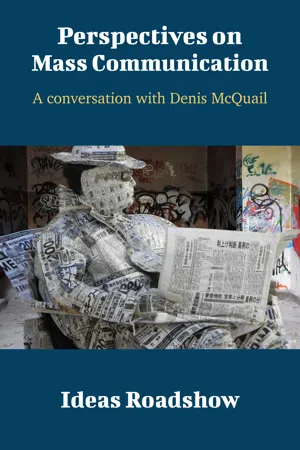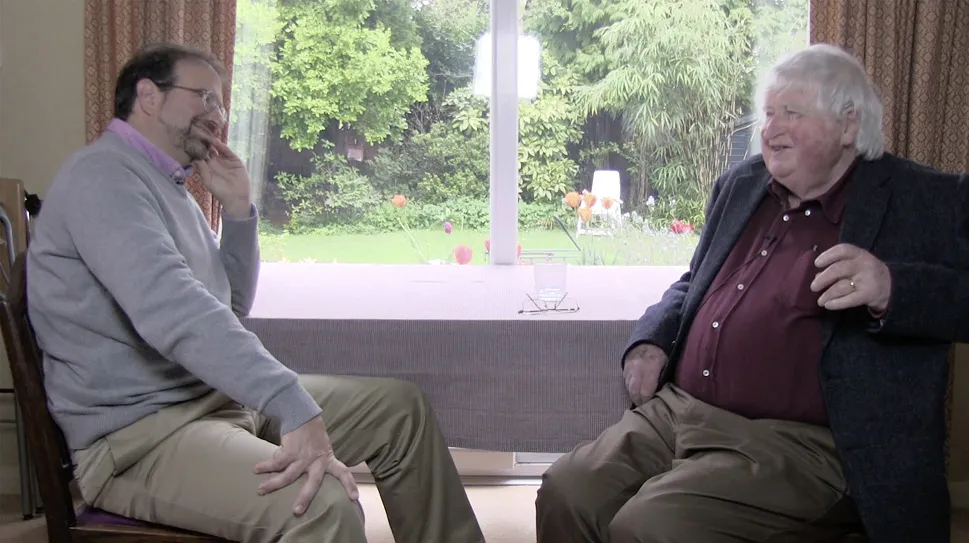![]()
The Conversation
![]()
I. Plunging into the Media
The beginnings of a unique career
HB: I would like to start by discussing your personal history and how you got involved in media and communications studies, how you moved into this field, and even what the field is, but we’ll get to that later. You started off studying history, didn’t you?
DM: Yes, I did. I studied history and I became rather dissatisfied with it. I also couldn’t find the employment I wanted after I was done studying it. In the last year of my studies I had discovered, by chance, something called sociology and that was something I hadn’t been aware of at all until that moment. I examined the University of Oxford course calendar and found that there was really only one way to study some sociology in a post-graduate diploma, so I took that.
I developed a very strong interest in social research and surveys, which were possibilities that seemed absent in history, possibilities for coming to some generalizations. History was very particularistic, especially in Oxford. There was a strong resistance to any general conclusions or theories about the world of the past, or even, I suppose, the present. It was very English, or British, untheoretical, empirical study, but empirical in a kind of unsystematic way, whereas sociology promised enlightenment about the world on a much larger scale.
HB: So this was more out of the spirit of general principles?
DM: It was focused on the possibilities for social research of some kind. I had an idea of doing research in a more applied field, for instance housing and planning. That was one area in which I had an interest, but it so happened that, just by chance, I was offered the possibility of working on a new research unit that was just being set up in Leeds University. This was a project for the study of the impact of television on British society, a topic that I hadn’t really thought about before that moment. So I was not seeking to do that, although I had always been interested in film.
HB: This was in the ’60s?
DM: This was in the late ’50s. The world of television was only just coming into being in Britain, because television at that time was only just reaching the majority of the population. The project was funded by Granada Television, one of the first of the ITV companies when they started commercial television in Britain. So this study partly had a public relations, good works origin. The owner of Granada Television was socialist as well as being very rich, and he had ideas about doing good in society.
The project spoke to strongly felt anxieties, at least in the cultural elites, about the potential benefit or harm of this powerful new medium, which was only just starting to replace radio as the main entertainment medium. It was a very interesting opportunity and it involved applying the skills of data collection, experimentation, surveys, and analysis, all of which appealed to me very much.
HB: Did you find yourself a little bit over your head all of a sudden?
DM: Not really. Well, I was inexperienced and young, but I was the assistant to a man who had a lot of experience studying audiences for BBC educational programming. His passion was also the measurement of results and the means by which you can make the best use of a public medium like broadcasting to improve general standards of education and knowledge in the society. So it had a social purpose and it involved quite a lot of experience and knowledge about what factors in broadcasting were most likely to be effective in attracting, keeping interest, and also communicating essential points, by way of different media: print, radio, and then audio-visual means.
At that time, in the 1950s, there was a major preoccupation with how media, different media, would perform in relation to each other. Of course, that has earlier origins in the United States and also in wartime research into propaganda, including motivational propaganda for military recruits and the civilian population. So there was a big impetus behind it. At that time, in the late ’50s, in Britain, there was a strong anti-commercial television lobby fearing the results of Americanization, and trivialization, and advertising, and consumerism, and all these things, versus the more high-minded BBC mission.
HB: What were the results of this study?
DM: Well, the first study was more or less given to us as a requirement. That was the study of an election. In the same year that unit began, when I joined it, there was going to be a general election in the UK. It was the first television election in the sense that it was the first time the majority of the population had television and it was also the first time a lot of rules and limitations on political broadcasting had been removed. Prior to that, television was more or less kept away from the political process. So there were very interesting questions about how this would change the nature of politics and how politics was conducted.
HB: And did it?
DM: Well, it did change the way politics was conducted a little bit, because a lot of effort and expectation was put into the parties’ political broadcasts, which were all broadcast at the same moment: the peak viewing time in the middle of an evening. So they had very large audiences and that was a new factor. It appeared to be a more important means through which people heard about things going on with the election; however, the results were pretty clear that the only really demonstrable, empirical result of television’s part in the process of communicating the election, was a general increase in the level of political information. So the medium informed, but it didn’t change voting intentions in any systematic way. It could be said that it did not persuade.
The model for the work was studies done in the United States—
HB: Well, there was this whole thing with Nixon and Kennedy and the first televised debate.
DM: This was just before all that actually.
HB: Right. That’s what I was going to say, because that’s the story that I’ve heard as a non-expert. You hear about how television affected that election because of the sweat on Nixon’s lip and so forth. People developed a visceral dislike for the man having seen him for the first time. And I think he himself said, “Were it only radio, I would have won this election.”
DM: Yes, that was part of the fear of an intervention of an irrelevant kind in the political process in the UK. As a result of which, no debates were allowed. In fact, not even now is there a proper framework for any kind of leader debate in the UK, as far as I know.
Every party had power at one time or another, and no party, no government, would yield any change in legal regulations that might conceivably give some advantage to their opponents. So it was stalemate. The main concern on the part of politics was that television should, preferably, have no impact at all. No harm in having a bit of information, but better not to intervene in any other way, by way of personalities or what have you.
This kind of result was not unique. Quite a lot of research was oriented towards demonstrating the power of television, which was one of those expectations that generally came with the different mass media since the 1920s, from film and radio, and so on. The outcomes were nearly always no significant differences. Whatever research design or experimental method one applied, as long it was well done, no big change could be found, nothing in public communication.
Now, there were clearly experimental situations for other communication purposes, like education, where differences could be and were found. But, in the public arena, there were basically too many other influences ...

